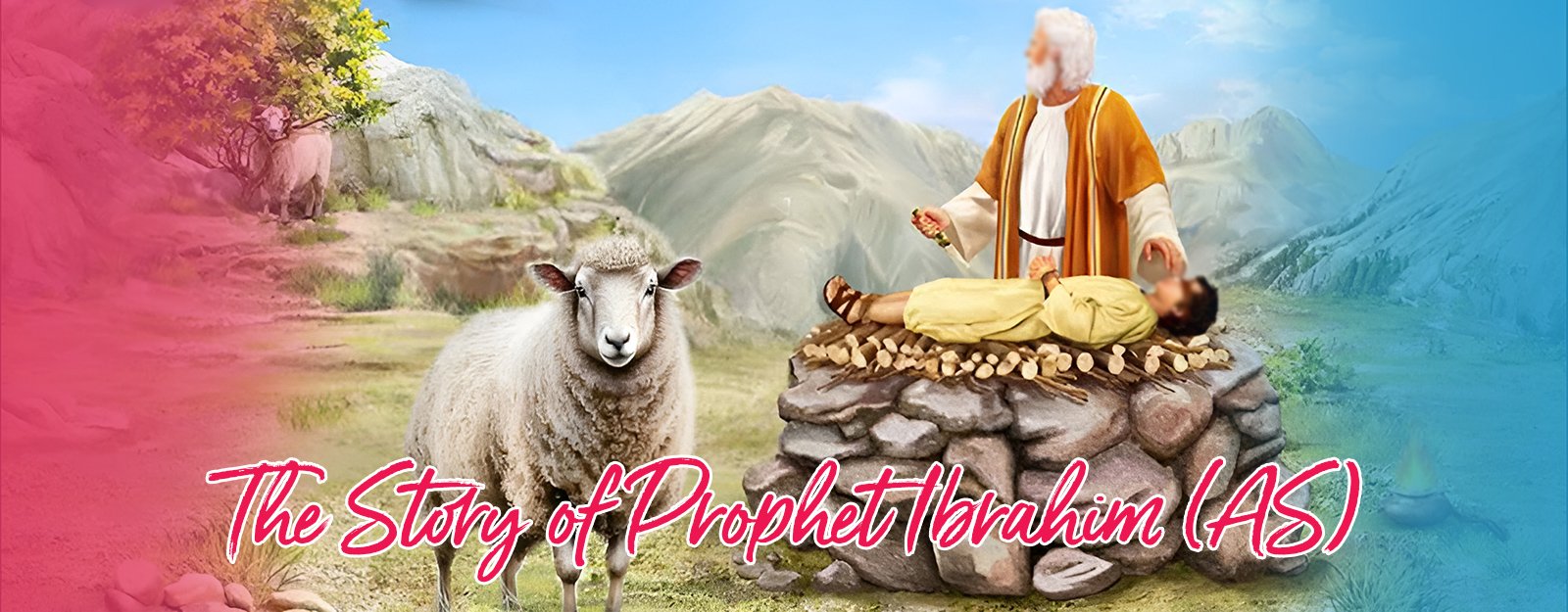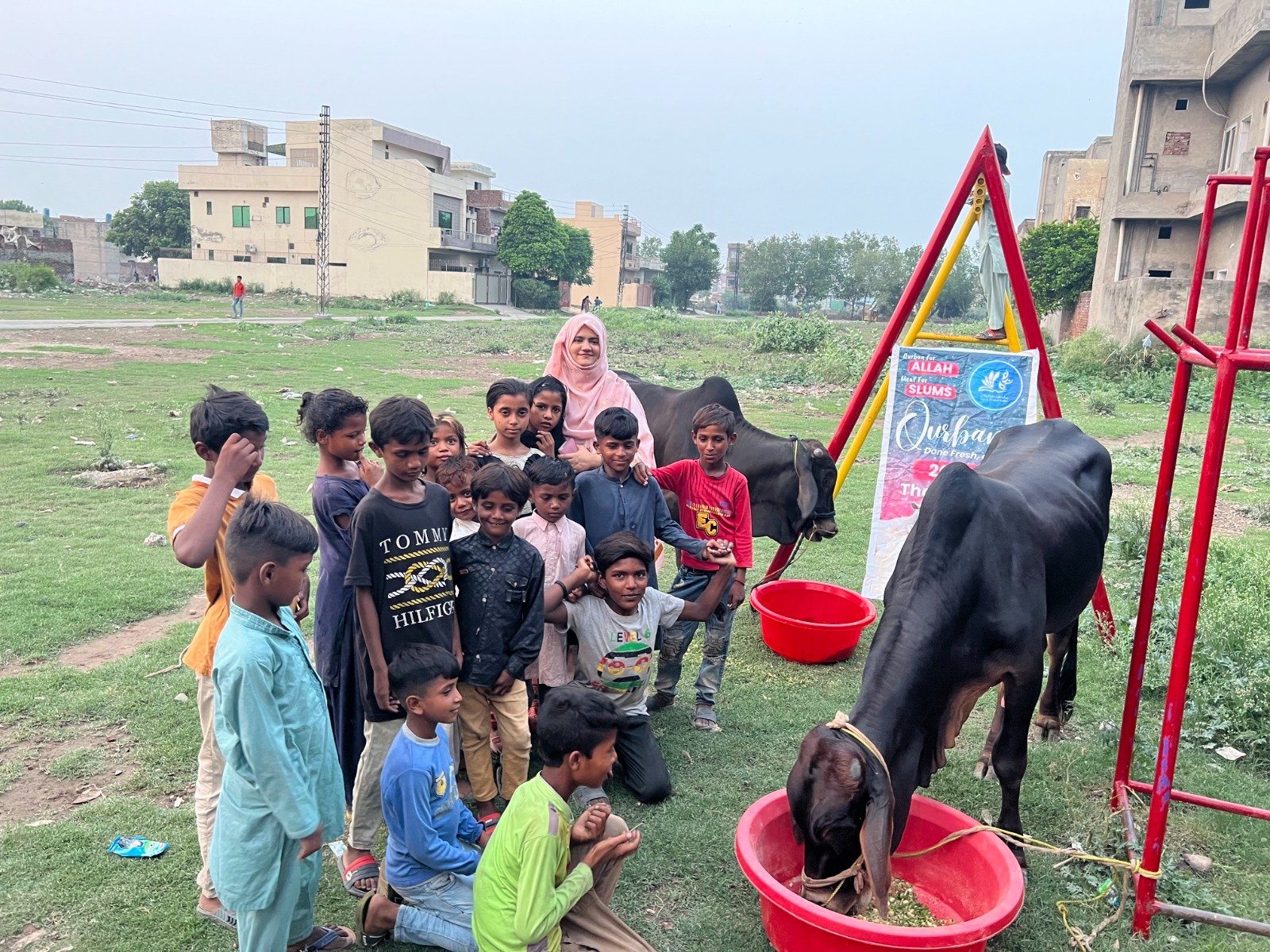
As Muslims around the world are preparing for Hajj and Eid-ul-Adha, it is important for everyone to remember the story behind Hajj and Qurbani.
All of this began with Ibrahim (A.S.), one of the prophets of Allah and His great creation. Ibrahim (A.S.) has been called a friend of Allah due to his obedience to Allah and his complete faith and submission to Allah’s orders. Today we are going to have a look at his life story and the reason why Hajj and Qurbani are associated with Ibrahim (A.S.).
Ibrahim (A.S.) was born in the kingdom of Babylon. His father was a very famous sculptor and was well-known for his art of crafting idols. He used to craft idols and worship them along with all the people of the Babylonian kingdom. Ibrahim A.S. always used to wonder why his father worshipped the idols. His father tried his best to convince him to worship idols, but the concept of worshipping idols never made sense to him. Ibrahim (A.S.) always had critical thinking and used to delve deep into the facts of nature and the universe. His father used to explain to him the reason behind worshipping idols, justifying that these idols represent the god they are worshipping. But none of these explanations ever satisfied him or his heart; he always knew that this was wrong.
He used to feel that these statues of wood and stone that couldn’t even help themselves were worth worshipping. How can they help people when they have no power to protect themselves? No justification from his father would answer his question, and he was in a continuous struggle to find the truth.

Ibrahim (A.S.) used to go on mountains and reflect on the wonders of nature. One day he travelled to a mountain and was sitting there observing the sky. He heard a voice—a voice he had never heard before. This was a divine call, a call from Allah for his beloved Prophet. Allah commanded him to submit and become a Muslim. Ibrahim (A.S.) immediately accepted Allah’s command and got to his feet. He accepted Islam, and his life was transformed. Eventually, his heart found the peace he had been looking for since he was very young.
Ibrahim (A.S.) now had a mission and the aim of his life, and that was spreading the message of Allah to everyone. It was like he found light when he was spending his whole life in the darkness, without any direction. He started preaching Islam to his beloved father, but his father was not ready to accept the truth. He denied submitting and accepting the truth of Allah and asked Ibrahim (A.S.) to leave his sight. Undeterred by his father’s reaction, Ibrahim (A.S.) continued to preach to the people around him. The people around him were not ready to accept Islam and were stubbornly clung to the idol worship.
Ibrahim (A.S.) was convinced that these people are stuck in ignorance and will not listen to him easily. Ibrahim (A.S.) came up with a plan that he thought would be enough to open their eyes.
When everyone in the town was planning to leave the town for a feast, Ibrahim (A.S.) had another plan. He wanted them to witness the helplessness of their idols and that they were of no use to them. For that, he destroyed every idol in their temple with his axe and left the axe on the shoulder of the biggest idol there. He didn’t demolish the biggest idol because he wanted to reveal the reality of the idols to their worshippers.
When they all came back, they were devastated to see their gods lying in ruins. They quickly gathered that the person behind it must be Ibrahim (A.S.), because he is the one who is against idol worship. Everyone was infuriated, and they turned to Ibrahim (A.S.) to ask if he was the one behind it. Ibrahim (A.S.) very calmly said that he is not the one who did it but the biggest statue who has the axe on his shoulder. He added that they should ask the idols who did this to them . Everyone said, “You know they can’t talk.” Ibrahim (A.S.) said that if they can’t talk, they can’t move by themselves, and they are not capable of protecting themselves, how can they protect you? This made everyone speechless, and they had no answer to his questions. They knew that Ibrahim (A.S.) was right, but their pride didn’t let them accept the truth.
People were enraged, and they decided to silence Ibrahim’s (A.S.) voice forever. They decided that they would come up with such a punishment that no one would dare raise their voice against their idol worshipping ever again. After discussion, they agreed upon throwing Ibrahim (A.S.) on fire, alive. This decision was sanctioned by Nimrood, the cruel ruler of the cruel nation, and everyone was happy with the decision. They dug a huge pit in the middle of the town and filled it with wood. The fire was so big that no one had ever seen such a huge fire before. With his arms and feet chained, Ibrahim (A.S.) was tied to a giant catapult that was supposed to throw him into the fire.
At this moment, Jibrael (A.S.), the angel of Allah, visited Ibrahim (A.S.) and asked him what his wish was at that time. Ibrahim (A.S.) asked for Allah’s help and His forgiveness. At this moment, when he had a million things to ask for, most importantly his life, Ibrahim (A.S.) asked for Allah’s forgiveness. Allah sent him a message that He wouldn’t let the fire harm His Prophet. The fire was ordered by Allah to become cool for Ibrahim (A.S.) and to not cause him any harm. They threw Ibrahim (A.S.) in the fire, and it didn’t even touch him and only burned his chains, allowing him to come out of the fire. He came out of the fire without a drop of sweat on his body.
Everyone there was surprised and shocked; they had seen a miracle of Allah and started saying that Ibrahim’s God had saved him. Although they witnessed everything with their eyes, their pride once again didn’t allow them to accept the truth, even when everything was before their eyes.
After the miracle of fire and defeating King Nimrood, Ibrahim (A.S.) continued his mission of spreading Allah’s teaching, but the only people following him were Sarah and Loot. Sarah was Ibrahim’s (A.S.) wife, and both wife and husband were dedicated to spreading Allah’s message to the people. They really wished to have a son who would continue their legacy and preach Islam to the people who are stuck in ignorance. But it was apparent that Sarah couldn’t conceive. Sarah had a female servant named Hajar, who was a very pious lady. Sarah suggested that Ibrahim (A.S.) should marry Hajar, as he is getting old and they can’t wait to have a son.
Ibrahim (A.S.) and Hajar got married. They used to pray with all their hearts to have a son who would take their message forward. Following the passionate prayers that Ibrahim and Hajar offered to Allah, Allah responded with a priceless gift in the form of a baby boy who was given the name Ismail. As they welcomed their newborn baby into the world, they were filled with optimism and thankfulness for this blessing that had been placed upon them. Their pleasure had no bounds.
Once Ibrahim (A.S.) was blessed with the son, the trials didn’t stop. Allah ordered him to leave his wife and son in the distant mountains of Makkah, where there was no sign of life. Following divine guidance, Ibrahim led his family into the vast expanse of the Arabian desert and left them there. As they journeyed through the scorching sands, they carried with them only a small supply of dates and water. However, as the days passed, their provisions dwindled, and they found themselves facing a dire situation.
Amidst their desperation, a miraculous event unfolded. Hajar, exhausted and parched, ran between the hills of As-Safa and al-Marwa in search of help. In a moment of divine intervention, the Angel Jibreel appeared, striking the ground with his foot, causing a gushing stream of water—Zamzam—to flow forth. This miraculous spring became a source of sustenance for Hajar and Ismail, quenching their thirst and providing them with the strength to endure.
With Zamzam as their lifeblood, Hajar and Ismail’s circumstances transformed dramatically. The once-barren desert became a thriving settlement as people flocked to the blessed waters, turning the desolate landscape into a bustling community. With the help of his mother’s love and Allah’s providence, Ismail developed into a strong and wise young man.
Years later, Ibrahim faced a monumental test of faith. In a profound dream, he received a divine command to sacrifice his beloved son, Ismail, as an act of obedience to Allah. Despite the immense weight of this command, both father and son submitted willingly to the will of God.
As Ibrahim prepared to carry out the sacrifice, Allah intervened, providing a ram as a substitute. This act of divine mercy spared Ismail’s life and affirmed Ibrahim’s unwavering faith and obedience.
In the aftermath of this trial, Ibrahim and Ismail were entrusted with a sacred mission—to construct the Kaaba, the holiest sanctuary of worship. Together, they laboured to build this sacred edifice, laying the foundation for generations of worshippers to come.
Today, Muslims around the world commemorate Ibrahim’s sacrifice through the rituals of Hajj and Qurbani. These acts serve as a reminder of Ibrahim’s unwavering faith and obedience to Allah’s command, inspiring believers to emulate his example of submission and devotion.
As Eid ul-Adha approaches, let us reflect on the profound sacrifices of Ibrahim and Ismail and strive to embody their spirit of compassion and mercy. By extending kindness and generosity to those in need, we honour their legacy and manifest the divine mercy of Allah in our lives.
SKZ Foundation celebrates Eid-ul-Adha, reminding those who can’t afford it of the great sacrifice of Ibrahim (A.S.).. The people living in slums are less fortunate and don’t have the resources to feed their children on a daily basis. Celebrating Eid-ul-Adha gives them access to the meat and delicious food that they can’t have on other days of the year. Help us bring joy to those who need it the most, celebrating the true spirit of Eid-ul-Adha.
We believe that only education and skill development can empower youth, shaping their futures and substantiating the deprived community.
BANK DETAILS
Bank Name: Bank Islami
Account Title: Saya E Khuda E Zuljalal
Account Number: 2053-5712157-0001
IBAN NUMBER: PK60BKIP0205357121570001
Bank Name: Cashplus Bank
Account Title: Saya E Khuda E Zuljlal
Account Number: 07845728
Sort Code: 08-71-99

© SKZ Foundation TM 2017. Privacy Statement , Terms & Conditions Registered Charity No: 1200520. Head Office: 4 hollis lock, Chelmsford CM2 6RR UK. Disclaimer: SKZ Foundation is not affiliated with any external websites. SKZ Foundation is not responsible for the content of external internet sites and any links from external web sites to this site do not constitute an endorsement of that site by SKZ Foundation.
Copyright @ 2024 Single Solution. All Rights Reserved.